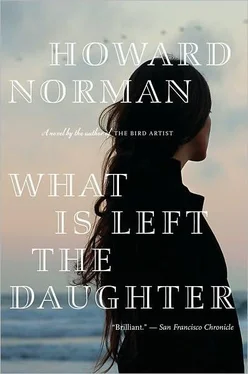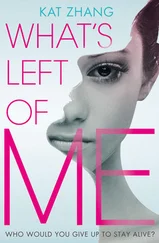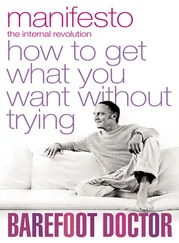When the RCN officer waved us away, we veered off, and just as we got out of range of the tugboat lights and into dark water, we saw a decomposed body, or what shapeless stuff was left of a body, inside a German uniform, contorting and changing shape with the movement of the water. Tom cut the engine and we drifted.
Really, the only thing that looked at all solid was the belt buckle. I'd seen the buckle glint, and now I shined my flashlight on it and— whoosh! — in swooped a gull, which nabbed the buckle. The gull tried to rise with it but was pulled back down, and the bird refused to let go. It sort of half fluttered above and half sat on the uniform, lifting it a little, attempting to dislodge the buckle. Eventually the gull abandoned the effort and coursed back up into the black rainy sky.
The three of us had drifted close to the body, and when Tom poked it with his gaffing hook, Hermione said, "If you keep doing that, I'll vomit on your shoes."
Tom pulled in his gaff and said, "Guess what? I vote against attending to these remains. Let's leave them alone."
"Me, too," I said.
"It's unanimous, then," Hermione said.
"Too bad that German sailor in the water there didn't live to see our example just now," Tom said, "of Canada being a country where everyone gets a vote, eh?"
We looked over at the U-boat. All that macabre industry. Sparks spraying off the industrial saw. I felt we were out among some madness or other.
"We should've grabbed some sandwiches or something," I said.
"I didn't think of it, either," Tom said.
We spent another five hours out there — wallets, shoes, plates, not much else. One logbook. One album of family photographs. Many items of clothing. Hour after hour, peering through binoculars, we followed the progress of the salvage crew and then, near dawn, saw U–99 towed in to Purdy's Wharf. It had taken the entire night, but they'd done it.
"Let's head in, too," Tom said. "We've done enough."
Hermione pointed to the five burlap sacks we'd filled. "Not all that much loot," she said. "Except for triple overtime, it's been a pretty useless night. But we won't tell anyone that, now will we?"
"Next time Charles tells us one of these bastards pops up in our harbor," Tom said, "we should bargain. Immediate retirement at full salary, plus we each get a house in Cape Breton, plus medical for the rest of our lives. Or else the answer's no."
"Let's stick together on that," Hermione said.
"I've never been to Cape Breton," I said. "Is it nice?"
Close to shore, Tom barely maneuvered around a flotilla of sea ducks, peacefully sleeping. And the tugs and U-boat had just passed noisily by. At Purdy's Wharf we stood awhile under a tarpaulin roof set on poles and watched close-up as six RCN itemized and photographed the contents of the burlap sacks. They were very methodical about it.
"I figure it as seven hours' triple overtime," Tom said.
"Seven and a half," Hermione said. "I'm the one wore a wristwatch out there, remember?"
Charles drove up. We got into his car. Hermione was the first to get dropped off at home. When Charles pulled up at the curb, he said, "All of you look like this whole night's been one solid punch in the gut. Today's what?"
"Thursday," Hermione said.
"My decision is, everybody takes the rest of today and Friday off."
"Good Lord, Charlie," Hermione said, "marry me."
"Do I have to tell my wife?"
"That question shows remorse in advance," Hermione said. "Forget it."
"Today and Friday off and full pay accorded," Charles said. "Meantime, I'll arrange a substitute crew, no problem there. If you want, drop by the office, I'll cash out your triple overtime. Otherwise, we'll take care of it Monday morning, first thing."
"See ya, fellas," Hermione said. "I'm off to dreamland. After a whiskey. And not on the rocks, either." She got out of the car.
Bone tired, I slept on and off throughout the day and night and late into Friday morning. Hardly got out of bed at all except for tea, a bowl of oatmeal, bathroom and to listen to the radio. Friday evening I dropped by Ballade & Fugue, and the moment I stepped through the door, I heard the teeth-grating sound of a needle gouging a gramophone record. "Talbot, you dunce!" Randall said. "I told you, if you carry a big stack of records like that, you can't see where you're going."
"Sorry, Pop," Talbot said. He was sixteen now.
Randall laughed. "That's okay. I'm always so happy when you're putting in hours here with me. Besides, that gramophone wasn't long for the world, anyway."
"Pop, try calling it a record player, remember? It's not your old RCA Victor anymore." There was great affection between them.
"Hey, Wyatt," Talbot said. "You're here — it must be Friday, right?"
"Last week I came in both Tuesday and Friday," I said.
"Right, my dad told me that."
"Wyatt, have some coffee and let's listen to Bach's unaccompanied cello suites," Randall said. "They make some people lose the will to live, but they cheer me right up."
"Just what the doctor ordered," I said.
"Listen to this from the liner notes," Randall said. "'Played as Bach intended they be, Pablo Casals succeeds in not allowing a single note of compromised sadness. A profound accomplishment.' Know what? I didn't know you could compromise sadness."
"I guess a lesser cellist could," Talbot said.
While the Bach cello pieces played, customers drifted in and out, a few making purchases. Suzanne, Talbot's girlfriend, dropped by, and Talbot left with her, and by eight o'clock it was just Randall and me. I thought, I've been coming to Randall's store for well over twenty years, subtracting my time in Rockhead, and I often thought about his store even then. There were no other consequences to the evening, I suppose, except that I envied Randall for having such passion and dedication toward his chosen profession, record store owner and classical music expert. He asked me about the U-boat, and I described it as best I could. "Somebody should've blasted some Wagner through loudspeakers off those tugboats," Randall said. "You know, provide a nostalgic sendoff to Hitler's finest. May they rot in peace."
And then we settled into the comfortable banter we'd come to rely on. Randall on the threadbare sofa, me in the chair with the lumpy cushion and broken springs, listening to cello music. Just before he closed up shop, Randall said, "Wyatt, my friend, wonders never cease."
"Don't tell me Ballade and Fugue is making a profit so far this year."
"Not quite that wonderful," he said. "An hour before you got here, one of those RCN who put me in hospital came in and apologized, right in front of my son. You could've knocked me over with a feather. He had his wife with him, and their two daughters. His German wife he'd met in Germany. She bought a few recordings."
Saturday afternoon I walked down to the harbor. U-99 was elevated in dry dock, on reinforced scaffolding. There was also a grid of beams, specially made to compensate for any possible shift in the bulk of the submarine. Upward of thirty people had come with their cameras, posing with U-99 in the background or taking pictures of the boat on its own. Trucks had converged from a local television station and the Department of Health, and an RCN jeep and a few other official-looking vehicles were parked nearby. On deck three men stood near the open hatch. They were wearing black frogmen's suits and buckle-up galoshes and had surgical masks over their mouths, a strange combination. One by one they climbed down, hauling in the hose of an industrial vacuum — the truck it was attached to was close by. On the truck's doors it read MONTREAUX REFUSE CONTROL. The City of Halifax often worked with these guys, and I always found them very competent. A fire truck was parked near the stern, and a fireman in full gear was blasting the hull with a pressure hose. Pretty soon the industrial vacuum could be heard rumbling at high throttle.
Читать дальше












